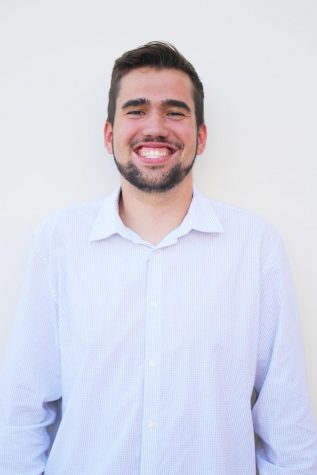The biggest topic on the agenda of the Student Government Association senate’s final meeting of the fall 2018 semester took about 15 minutes to pass, as the spring 2019 budget was quickly approved. However, two proposals from SGA’s diversity staffers, vice president of diversity Mindy Kim and diversity coordinator Jasmine Teeny, immediately forced the senate to consider devoting large swaths of that budget to ambitious early-semester projects.
VP of finance, technology and human resources Nathan Carmack’s 2019 budget brought a payroll raise for all staffers to $12 per hour in order to comply with California’s new minimum wage requirement. To allocate money for the increased payroll, Carmack lowered each senator’s discretionary budget next spring from $100 to $75, a change that was met with widespread support from the senate. President Sierra McCoy also said she was considering having Carmack set aside a certain portion of the budget for internal proposals only.
The same-day vote to approve the budget passed unanimously, 11-0.
MLK CHAPEL PROPOSAL DENIED
Kim submitted an internal proposal to help Spiritual Development cover speaker and event fees for the Jan. 18 edition of the Biola Hour chapel. The chapel would focus on Martin Luther King Jr. Day by hosting Albert Tate, pastor of Fellowship Monrovia in Monrovia, California, and a popular, nationally recognized speaker.
The $3,648.84 proposal would cover Tate’s speaker fee as well as food and event costs for a free talk with Tate, open to students, after the chapel. However, senators expressed concerns about the high cost of Tate’s speaker fee as well as the likelihood that, since the chapel is scheduled for the Friday morning of a long weekend, it would not receive nearly enough attention or attendance to warrant bringing in such a high-profile speaker, even with some added publicity.
Off Campus Community senator Naomi Hidalgo also led a push to lower the food and event costs, citing previous ways the senate has shaved fundings for proposals by finding workarounds to those costs.
Hart Hall senator Noah Love said he understood the value in bringing high-profile Christian speakers to Biola, and expressed enthusiasm to fund speaker fees like this in the future, but said he could not support the proposal because of his concerns about the chapel’s attendance.
Bluff senator Lauren Sutter said that while she understood the difficulty in changing chapel and speaker schedules based on her past experience working with Spiritual Development, she considered the speaker fee exorbitant compared to other speaker fees SGA has funded, such as the ones for the Woven women’s leadership conference.
Hidalgo also opposed the scheduling for the chapel, saying she takes the preferred Friday chapel scheduling personally as a commuter who, like many other commuters, never travels to campus on Fridays. Morris pointed out that there are ways to still use resources for a Martin Luther King Jr. Day chapel, citing a video of Bob Goff at the previous night’s AfterDark chapel that she found to be impactful even though Goff was not present in person.
The consensus opinion among the senate was that supporting the diversity and inclusion sector at Biola, which McCoy pointed out is still forming, should be a major priority. However, Hidalgo and others also stated reluctance to be recognized for helping dump such a large amount of money—and a large portion of SGA’s remaining budget—into an event on the first week of the spring semester that would likely be lightly attended.
Some solutions to partially fund the proposal were considered, but the senate had difficulty working around the firm speaker fee. The senate expressed a willingness to consider a similar proposal for a different chapel at another relevant time, such as Black History Month in February or the 51st anniversary of King’s death in early April. However, a vote to unilaterally deny Kim’s proposal passed 10-0-1, with Bluff senator Gabriel Plendcio abstaining.
BCC PROPOSAL TO BE REVISITED
The final order of business was Teeny’s proposal for $4,000 to fund 100 scholarships to the Biola Counseling Center as part of the McCoy administration’s increased prioritization of student mental health. The scholarships would cover each student’s first two trips to the BCC, which cost $20 each.
The senate decided against holding a same-day vote on the proposal, instead effectively tabling it to the spring, when it will be one of the top items on the agenda.








